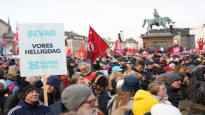Despite the citizens’ protests, the government decided to abandon the Store Bededaging holiday.
19:42•Updated 19:42
In the future, Danes will have one day off per year less than before.
On Tuesday, the Danish parliament voted to change Store Bededaging, the big day of prayer, to a weekday.
95 of the representatives of the Parliament voted for the change and 68 against.
Denmark’s blue-red government, which has been in power since December, suggested in January that Denmark could waive one of its public holidays to improve the country’s economic productivity.
The government calculated that giving up the public holiday would bring savings of around three billion kroner, i.e. around 420 million euros, to Denmark’s coffers and increase productivity by 7.4 hours per employee.
The Prime Minister of the country, of the Social Democrats Mette Frederiksen has also hinted that the funds saved from the holiday could be used to increase the country’s defense budget.
– I don’t think that an extra working day is a problem. We need money for defense, security, healthcare, psychiatry and the green transition, Frederiksen said in January when presenting the government program.
Frederiksen reasoned that giving up the public holiday is important, among other things, because Russia is waging a war of aggression in Ukraine.
At the same time, Denmark aims to increase its defense spending to the two percent demanded by the military alliance NATO.
The government did not listen to the protesters
Prayer Day has usually been celebrated on the fourth Friday after Easter.
The day has been a holiday in Denmark since 1686.
Citizens have been opposing the change of the Great Prayer Day from a public holiday to a weekday since February.
At the beginning of February, at least 50,000 people gathered in front of the parliament to oppose the change. Among other things, representatives of trade unions have been involved in protests against giving up the public holiday.
On Tuesday, thousands of people protested the government’s vote.
Sources: Reuters, AFP
